

Hand expressing. Pumping. Storage/use. Feeding. Sterilising. Bottle preference. Helping with night feeds. Expressing Breast Milk - Association of Breastfeeding Mothers. Why express?
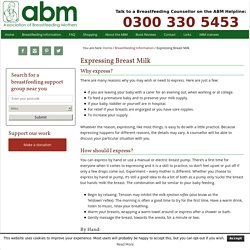
There are many reasons why you may wish or need to express. Here are just a few: If you are leaving your baby with a carer for an evening out, when working or at college.To feed a premature baby and to preserve your milk supply.If your baby, toddler or yourself are in hospital.For relief if your breasts are engorged or you have sore nipples.To increase your supply. Whatever the reason, expressing, like most things, is easy to do with a little practice. Because expressing happens for different reasons, the details may vary. How should I express? You can express by hand or use a manual or electric breast pump. Begin by relaxing. By Hand: Stimulate hormone release: Massage your breast in a circular manner. Identify where you need to put your fingers in order to express your milk: Cup the breast with the palm of your hand.
Express the milk: Compress the breast tissue over the magic spot. By Pump: Battery and Electric Pumps: Double Pumping: Can I hire a pump? Any other tips? Are There Differences Between Breastfeeding Directly and Bottle-feeding Expressed Milk? From the breast or from the bottle, fresh or frozen, your milk provides all of the nutrition your baby needs for normal growth and development and much more.
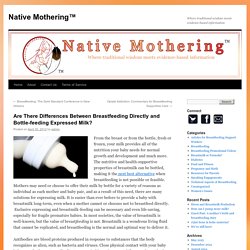
The nutritive and health-supportive properties of breastmilk can be bottled, making it the next best alternative when breastfeeding is not possible or feasible. Mothers may need or choose to offer their milk by bottle for a variety of reasons as individual as each mother and baby pair, and as a result of this need, there are many solutions for expressing milk. It is easier than ever before to provide a baby with breastmilk long-term, even when a mother cannot or chooses not to breastfeed directly. Exclusive expressing and breastmilk-feeding can be necessary and even life-saving, especially for fragile premature babies. In most societies, the value of breastmilk is well-known, but the value of breastfeeding is not. Breastfeeding supports the normal development of a baby’s jaw, teeth, facial structure, and speech. The Breastfeeding Mother: Are There Differences Between Breastfeeding Directl...
From the breast or from the bottle, fresh or frozen, your milk provides all of the nutrition your baby needs for normal growth and development and much more.
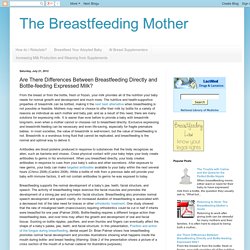
The nutritive and health-supportive properties of breastmilk can be bottled, making it the next best alternative when breastfeeding is not possible or feasible. Mothers may need or choose to offer their milk by bottle for a variety of reasons as individual as each mother and baby pair, and as a result of this need, there are many solutions for expressing milk. It is easier than ever before to provide a baby with breastmilk long-term, even when a mother cannot or chooses not to breastfeed directly. Exclusive expressing and breastmilk-feeding can be necessary and even life-saving, especially for fragile premature babies.
In most societies, the value of breastmilk is well-known, but the value of breastfeeding is not. Breastfeeding supports the normal development of a baby’s jaw, teeth, facial structure, and speech. More information: Mammæ: The (Un)necessary Breast Milk stash? Some of the concerns I hear most frequently from breastfeeding mums are around windy, gassy babies with green frothy poo.
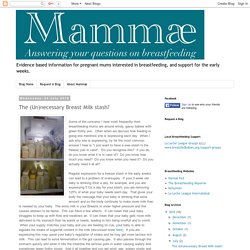
Often when we discuss how feeding is going she mentions she is expressing each day. When I ask why she is expressing, by far the most common answer I hear is "I just want to have a wee stash in the freezer, just in case". Do you recognise this? If you do, do you know what it is in case of? Do you know how much you need? Regular expression for a freezer stash in the early weeks can lead to a problem of oversupply. The Unseen Consequences of Pumping Breast Milk. A serious pregnancy complication sent first-time mom Missy Boss into an emergency cesarean section; by the time she delivered, her blood pressure was at pre-stroke levels.
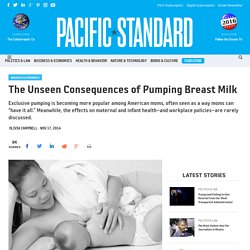
Boss says since she didn’t have the all-natural, drug-free childbirth she’d planned, she was “determined to do at least one thing right: breastfeed.” In the 56 hours after coming home from the hospital with her son, Boss never slept. Her son wouldn’t nurse. She spent one entire eight-hour stretch just trying to get him to latch onto her breast, but he wasn’t having it. She’d had as many lactation consultant visits as her insurance would cover and couldn’t afford the $600 per visit after that. There’s an assumption that bottle-feeding breast milk to a child is equivalent to breastfeeding, but that may not be the case. The practice of pumping frequently or exclusively is continuing to grow. “UNBEKNOWNST TO MOST HEALTH professionals, a revolution is taking place in the way U.S. infants are fed human milk.